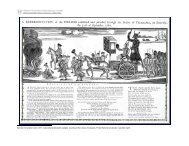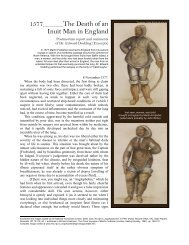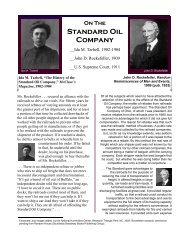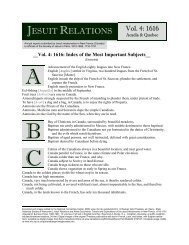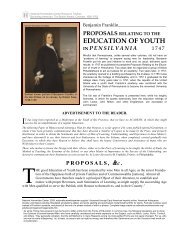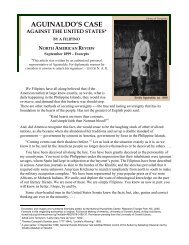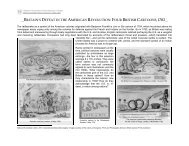Jenny Proctor - National Humanities Center
Jenny Proctor - National Humanities Center
Jenny Proctor - National Humanities Center
You also want an ePaper? Increase the reach of your titles
YUMPU automatically turns print PDFs into web optimized ePapers that Google loves.
<strong>National</strong> <strong>Humanities</strong> <strong>Center</strong> Resource Toolbox<br />
The Making of African American Identity: Vol. I, 1500-1865<br />
Narrative of<br />
<strong>Jenny</strong> <strong>Proctor</strong><br />
* Enslaved in Alabama, 1850-1865<br />
Interview conducted ca. 1937, San Angelo, Texas<br />
Federal Writers’ Project, WPA<br />
In the 1930s over 2,300 formerly enslaved African Americans<br />
were interviewed by members of the Federal Writers' Project,<br />
a New Deal agency in the Works Progress Administration<br />
(WPA) during the Great Depression.<br />
<strong>Jenny</strong> <strong>Proctor</strong>’s narrative is reproduced in full below as<br />
transcribed by the interviewer (brief introductory<br />
comments omitted). Bracketed notes added by NHC.<br />
Library of Congress<br />
I’s hear tell of dem good slave days but I aint nev’r seen no<br />
good times den. My mother’s name was Lisa and when I was a<br />
very small chile I hear dat driver goin’ from cabin to cabin as<br />
early as 3 o’clock in de mornin’ and when he comes to our<br />
cabin he say, “Lisa, Lisa, git up from dere and git dat breakfast.” My mother, she was cook and I don’t<br />
<strong>Jenny</strong> <strong>Proctor</strong>, 87, on the front steps of<br />
her home, San Angelo, Texas, ca. 1937<br />
recollect nothin’ ’bout my father. If I had any brothers and sisters I didn’ know it. We had ole ragged huts<br />
made out of poles and some of de cracks chinked up wid mud and moss and some of dem wasn’t. We<br />
didn’ have no good beds, jes’ scaffolds nailed up to de wall out of poles and de ole ragged beddin’<br />
throwed on dem. Dat sho’ was hard sleepin’ but even dat feel good to our weary bones after dem long<br />
hard days work in de field. I ’tended to de chillun when I was a little gal and tried to clean de house jes’<br />
like ole miss tells me to. Den soon as I was 10 year ole, ole marster, he say, “Git dis yere nigger to dat<br />
cotton patch.” I recollects once when I was tryin’ to clean de house like old miss tell me, I finds a biscuit<br />
and I’s so hungry I et it, ’cause we nev’r see sich a thing as a biscuit only some times on Sunday mornin’.<br />
We jes’ have co’n braid and syrup and some times fat bacon, but when I et dat biscuit and she comes in<br />
and say, “Whar dat biscuit?”<br />
I say, “Miss, I et it ’cause I’s so hungry.” Den she grab dat broom and start to beatin’ me over de head<br />
wid it and callin’ me low down nigger and I guess I jes’ clean lost my head ’cause I know’d better den to<br />
fight her if I knowed anything ’tall, but I start to fight her and de driver, he comes in and he grabs me and<br />
starts beatin’ me wid dat cat-o’-nine-tails. 1 and he beats me ’til I fall to de floor nearly dead. He cut my<br />
back all to pieces, den dey rubs salt in de cuts for mo’ punishment. Lawd, Lawd, honey! Dem was awful<br />
days. When ole marster come to de house he say, “What you beat dat nigger like dat for?” And de driver<br />
tells him why, and he say, “she can’t work now for a week, she pay for several biscuits in dat time.” He<br />
sho’ was mad and he tell ole miss she start de whole mess. I still got dem scars on my ole back right now,<br />
jes’ like my grandmother have when she die and I’s a-carryin’ mine right on to de grave jes’ like she did.<br />
Our marster, he wouldn’ ’low us to go fishing, he say dat too easy on a nigger and wouldn’ ’low us to<br />
hunt none either, but some time we slips off at night and ketch ’possums and when old marster smells<br />
dem ’possums cookin’ way in de night he wraps up in a white sheet and gits in de chimney corner and<br />
*<br />
<strong>National</strong> <strong>Humanities</strong> <strong>Center</strong>, 2007: www.nhc.rtp.nc.us/pds/tblibrary.htm. Text and photographs courtesy of the Library of Congress, Manuscript<br />
Division. WPA Slave Narrative Project (Texas Narratives, Vol. 16, Part 3), Federal Writers’ Project, U.S. Work Projects Administration (USWPA).<br />
Digital images of all typed transcribed interviews at http://memory.loc.gov/ammem/snhtml/snhome.html.<br />
1<br />
A big leather whip, branching into nine tails. [Interviewer’s footnote]
scratch on de wall and when de man in de cabin goes to de door and say, “Who’s dat?” He say, “It’s me,<br />
what’s ye cookin’ in dere?” and de man say, “I’s cookin’ ’possum.” He say, “Cook him and bring me de<br />
hind quarters and you and de wife and de chillun eat de rest.” We nev’r had no chance ter git any rabbits<br />
’cept when we was a-clearin’ and grubbin’ de new grounds, den we ketch some rabbits and if dey looks<br />
good to de white folks dey takes dem and if dey no good de neggers git dem. We nev’r had no gardens.<br />
Some times de slaves git vegetables from de white folks’ garden and sometimes dey didn’.<br />
Money? Umph um! We nev’r seen no money. Guess we’d a bought sumpin’ to eat wid it if we ev’r<br />
seen any. Fact is, we wouldn’ a knowed hardly how to bought anything, ’cause we didn’ know nothin’<br />
’bout goin’ to town.<br />
Dey spinned de cloth what our clothes was made of and we had straight dresses or slips made of<br />
lowel [coarse cotton]. Sometimes dey dye ’em wid sumac berries or sweet gum bark and sometimes dey<br />
didn’. On Sunday dey make all de chillun change, and what we wears ’til we gits our clothes washed was<br />
gunny sacks wid holes cut for our head and arms. We didn’ have no shoes ’ceptin’ some home made<br />
moccasins and we didn’ have dem ’til we was big chillun. De little chillun dey goes naked ’til dey was<br />
big enough to work. Dey was soon big enough though, ’cordin’ to our marseter. We had red flannel for<br />
winter under clothes. Ole miss she say a sick nigger cost more den de flannel.<br />
Weddin’s? Ugh um! We jes’ steps over de broom and we’s married, Ha! Ha! Ha!<br />
Ole marster he had a good house. De logs was all hewed off smooth like and de cracks all fixed wid<br />
nice chinkin’, plum ’spectable lookin’ even to de plank floors, dat was sumpin’. He didn’ have no big<br />
plantation but he keeps ’bout 300 slaves in dem little huts wid dirt floors. I thinks he calls it four farms<br />
what he had.<br />
Sometines he would sell some of de slaves off of dat big auction block to de highest bidder when he<br />
could git enough fer one.<br />
When he go to sell a slave he feed dat one good for a few days, den when de goes to put ’em up on de<br />
auction block he takes a meat skin and greases all ’round dat nigger’s mouth and makes ’em look like dey<br />
been eatin’ pleanty meat and sich like and was good and strong and able to work. Sometimes he sell de<br />
babes from de breas’ and den again he sell de mothers from de babes and de husbands and de wives, and<br />
so on. He wouldn’ let ’em holler much when de folks be sold away. He say, “I have you whooped if you<br />
don’t hush.” Dey sho’ loved dere six chillun though. Dey wouldn’ want no body buyin’ dem.<br />
We might a done very well if de ole driver hadn’ been so mean’ but de least little thing we do he beat<br />
us for it, and put big chains ’round our ankles and make us work wid dem on ’til de blood be cut out all<br />
around our ankles. Some of de marsters have what dey call stockades and puts dere heads and feet and<br />
arms through holes in a big board out in de hot sun, but our old driver he had a bull pen, dats only thing<br />
like a jail he had. When a slave do anything he didn’ like he takes ’em in dat bull pen and chains ’em<br />
down, face up to de sun and leaves ’em dere ’til dey nearly dies.<br />
None of us was ’lowed to see a book or try to learn. Dey say we git smarter den dey was if we learn<br />
anything, but we slips around and gits hold of dat Webster’s old blue back speller and we hides it ’til way<br />
in de night and den we lights a little pine torch, 2 and studies dat spellin’ book. We learn it too. I can read<br />
some now and write a little too.<br />
Dey wasn’t no church for de slaves but we goes to de white folks arbor on Sunday evenin’ and a<br />
white man he gits up dere to preach to de niggers. He say, “Now I takes my text, which is, nigger obey<br />
your marster and your mistress, ’cause what you git from dem here in dis world am all you ev’r goin’ to<br />
git, ’cause you jes’ like de hogs and de other animals, when you dies you aint no more, after you been<br />
throwed in dat hole.” I guess we believed dat for a while ’cause we didn’ have no way findin’ out<br />
different. We didn’ see no Bibles.<br />
2 Several long splinters of rich pine, of a lasting quality and making a bright light. [Interviewer’s footnote]<br />
<strong>National</strong> <strong>Humanities</strong> <strong>Center</strong>. WPA Narrative of <strong>Jenny</strong> <strong>Proctor</strong>, ca. 1937. 2
Sometimes a slave would run away and jes’ live wild in de woods but most times dey ketch’em and<br />
beats ’em, den chains ’em down in de sun ’til dey nearly die. De only way any slaves on our farm ev’r<br />
goes anywhere was when de boss sends him to carry some news to another plantation or when we slips<br />
off way in de night. Sometimes after all de work was done a bunch would have it made up to slip out<br />
down to de creek and dance. We sho’ have fun when we do dat, most times on Sat’day night.<br />
All de Christmas we had was ole marster would kill a hog and give us a piece of pork. We thought dat<br />
was sumpin’ and de way Christmas lasted was ’cordin’ to de big sweet gum back log what de slaves<br />
would cut and put in de fireplace. When dat burned out, de Christmas was over. So you know we all<br />
keeps a lookin’ de whole year ’round for de biggest sweet gum we could find. When we jes’ couldn’ find<br />
de sweet gum we git oak, but it wouldn’ last long enough, ’bout three days on average, when we didn’<br />
have to work.<br />
We had a few little games we play, like Peep Squirrel Peep, You Can’t Catch Me, and sich like. We<br />
didn’ know nothin’ ’bout no New Years Day or holidays ’cept Christmas.<br />
We had some co’n shuckin’s sometimes but de white folks gits de fun and de nigger gits de work. We<br />
didn’ have no kind of cotton pickin’s ’cept jes’ pick our own cotton. I’s can hear dem darkies now, goin’<br />
to de cotton patch way ’fore day a singin’:<br />
“Peggy, does you love me now?”<br />
One ole man he sing:<br />
“Sat’day night and Sunday too<br />
Young gals on my mind,<br />
Monday mornin’ way ’fore day<br />
Ole marster got me gwine.<br />
Chorus:<br />
Peggy, does you love me now?”<br />
Den he whoops a sort of nigger holler, what nobody can do jes’ like dem ole time darkies, den on he goes,<br />
“Possum up a ’simmon tree,<br />
Rabbit on de ground<br />
Lawd, Lawd, ’possum,<br />
Shake dem ’simmons down.<br />
Peggy, does you love me now?<br />
Holler<br />
Rabbit up a gum stump<br />
’Possum up a holler<br />
Git him out little boy<br />
And I gives you half a dollar.<br />
Peggy, does you love me now?”<br />
We didn’ have much lookin’ after when we git sick. We had to take de worst stuff in de world fer<br />
medicine, jes’ so it was cheap. Dat ole blue mass and bitter apple would keep us out all night. Sometimes<br />
he have de doctor when he thinks we goin’ to die, ’cause he say he aint got any one to lose, den dat<br />
calomel what dat doctor would give us would purty nigh kill us. Den dey keeps all kinds of lead bullets<br />
and asafoetida [medicinal herb] balls ’round our necks and some carried a rabbit foot wid dem all de time<br />
to keep off evil of any kind.<br />
Lawd, Lawd, honey! It seems impossible dat any of us ev’r lived to see dat day of freedom, but thank<br />
God we did.<br />
<strong>National</strong> <strong>Humanities</strong> <strong>Center</strong>. WPA Narrative of <strong>Jenny</strong> <strong>Proctor</strong>, ca. 1937. 3
When ole marster comes down in de cotton patch to tells us ’bout bein’ free, he say, “I hates to tell<br />
you but I knows I’s got to, you is free, jes’ as free as me or anybody else whats white.” We didn’ hardly<br />
know what he means. We jes’ sort of huddle ’round together like scared rabbits, but after we knowed<br />
what he mean, didn’ many of us go, ’cause we didn’ know where to of went. Ole marster he say he give<br />
us de woods land and half of what we make on it, and we could clear it and work it or starve. Well, we<br />
didn’ know hardly what to do ’cause he jes’ gives us some ole dull hoes an’ axes to work with but we all<br />
went to work and as we cut down de trees and de poles he tells us to build de fence ’round de field and we<br />
did, and when we plants de co’n and de cotton we jes’ plant all de fence corners full too, and I never seen<br />
so much stuff grow in all my born days, several ears of co’n to de stalk and dem big cotton stalks was a<br />
layin’ over on de ground. Some of de ole slaves dey say dey believe de Lawd know sumpin’ ’bout niggers<br />
after all. He lets us put co’n in his crib and den we builds cribs and didn’ take long ’fore we could buy<br />
some hosses and some mules and some good hogs. Dem mangy hogs what our marster give us de first<br />
year was plum good hogs after we grease dem and scrub dem wid lye soap. He jes’ give us de ones he<br />
though was sho’ to die but we was a gittin’ goin’ now and ’fore long we was a buildin’ better houses and<br />
feelin’ kind of happy like. After ole marster dies we keeps hearin’ talk of Texas and me an’ my ole man,<br />
I’s done been married several years den and had one little boy, well we gits in our covered wagon wid our<br />
little mules hitched to it and we comes to Texas. We worked as share croppers around Buffalo, Texas ’til<br />
my ole man he died. My boy was nearly grown den so he wants to come to San Angelo and work, so here<br />
we is. He done been married long time now and got six chillun. Some of dem work at hotels, and cafes<br />
and fillin’ stations and in homes.<br />
<strong>National</strong> <strong>Humanities</strong> <strong>Center</strong>. WPA Narrative of <strong>Jenny</strong> <strong>Proctor</strong>, ca. 1937. 4


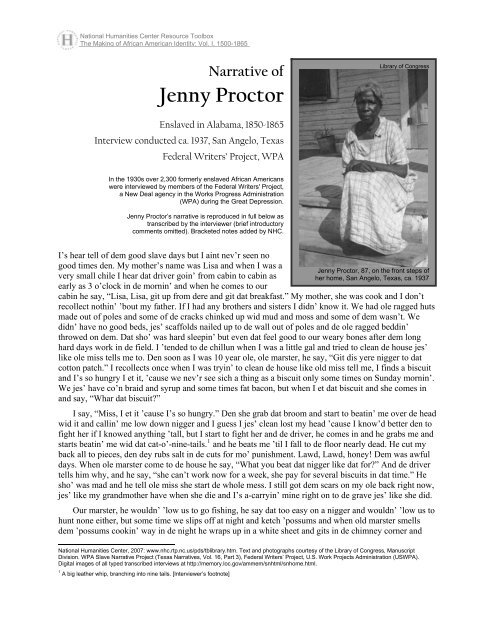
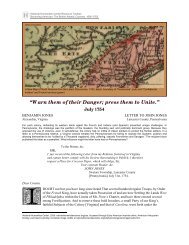
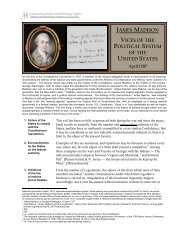
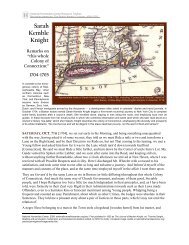
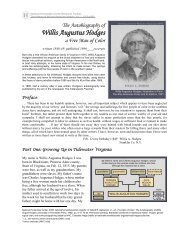
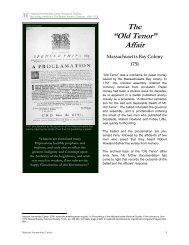
![The Requerimiento [Requirement], Council of Castile, 1510 ...](https://img.yumpu.com/21979685/1/190x245/the-requerimiento-requirement-council-of-castile-1510-.jpg?quality=85)
